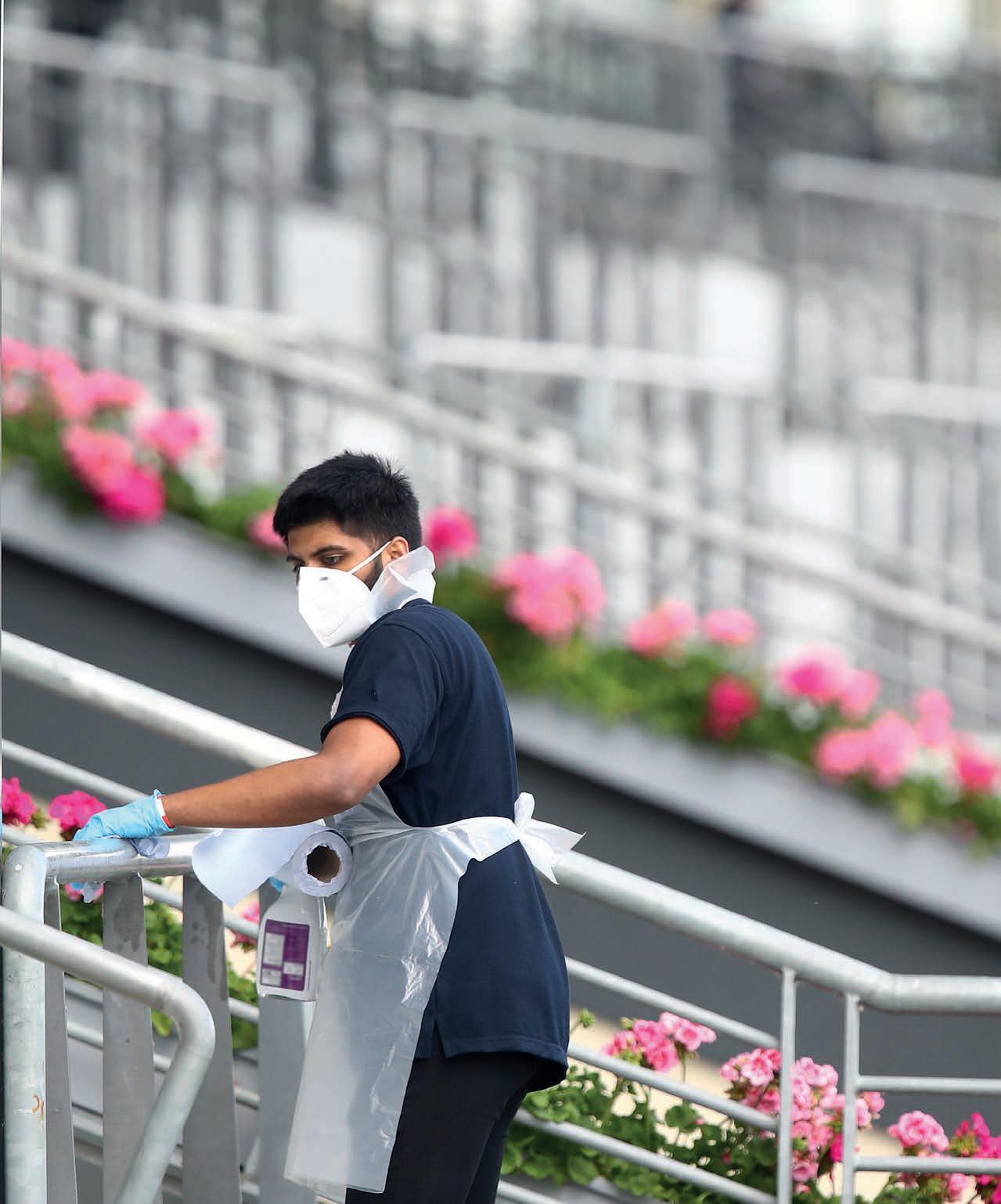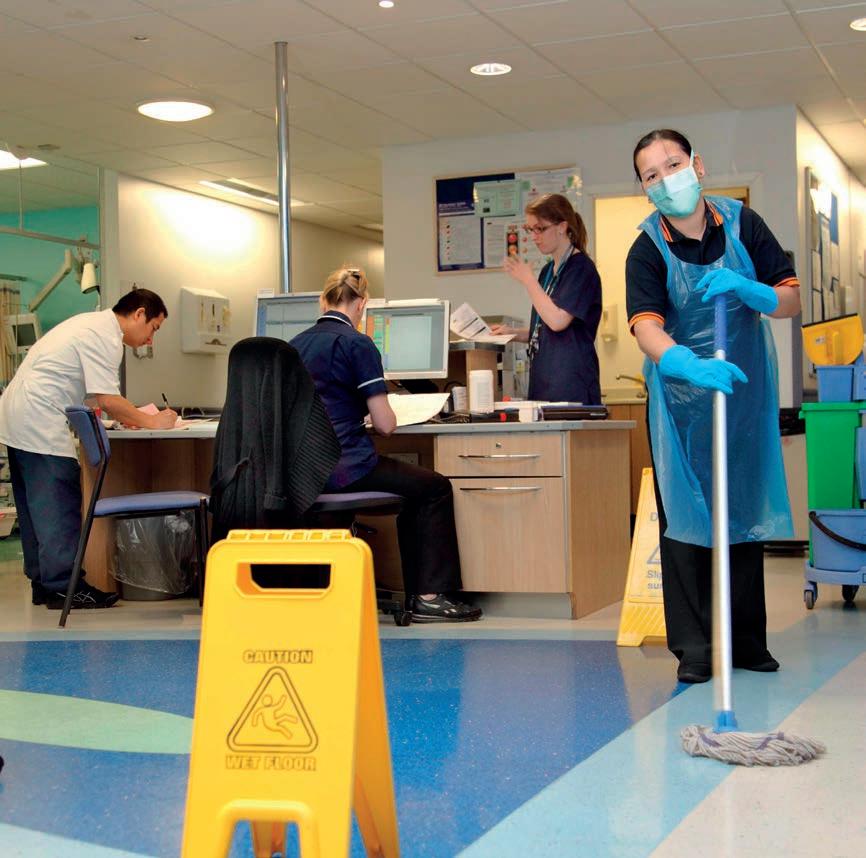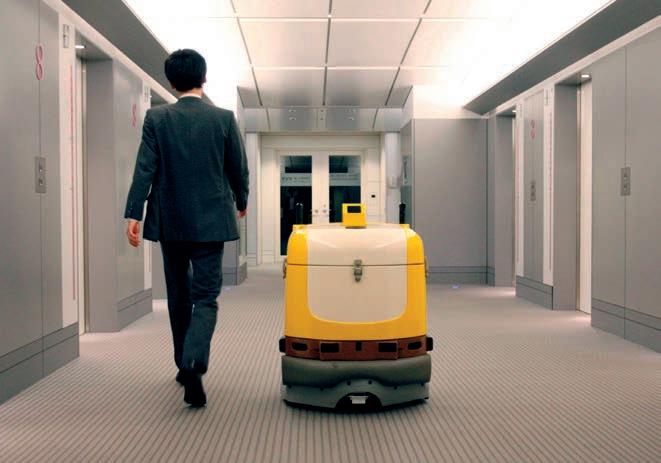
15 minute read
People problem
FEATURES / PERSONNEL PINCH
PEOPLE PROBLEM
Dramatically restricted availability of facilities service personnel will be a key topic in 2022, with clients’ acceptance of increased cost, more government lobbying, closer client-provider relationships and increasing automation featuring high in the sector’s response. Dean Gurden reports
Facilities management has always had to work hard to encourage people to take on frontline service delivery roles and then stay within the sector. But, right now, the problem of an unprecedented staffing shortage threatens to introduce uncomfortable conversations about cost and value into the equation. A perfect storm of factors has left most service lines scrambling to fill places. Although cleaning is high in the public consciousness as a result of the pandemic, other key facilities service lines are affected in similar ways. In the entertainment sector, the Night Time Industry Association (NTIA) agrees that Brexit has been a key contributor to a huge shortfall in door security guards, and it also seeks more flexibility from the government to allow recruitment from outside of the UK. This is not, of course, just a service problem. The construction sector is looking at nearly 40 per cent year-on-year growth in unfilled vacancies. So how have things become so bad? Naturally, Brexit is high on any list of reasons for the huge gap between FM vacancies and those expressing an interest. TACKLING THE LABOUR SHORTAGE “A lot of people left IN SUMMARY: the UK who might have fulfilled some of the roles,” confirms Paul Connolly,
Brexit, the immigration bill and CEO of FM recruiter 300 the pandemic have transformed the recruitment markets for facilities service personnel; North. “For the first time in years we’ve got minus
Clients and providers are working net migration, with more collectively to mitigate the impact of people leaving the UK reduced personnel numbers; and than coming in. That Demands by employees for greater flexibility in their contracted hours is being simply can’t be allowed addressed slowly. to continue.” Connolly also cites the new immigration bill [Nationality and Borders Bill of 2021-22], within which many soft-skilled FM roles are not listed, as a factor.
“And then, on top of that you’ve got Covid,” he adds. “Yes, the number of people in employment increased when the furlough scheme ended. But many are still worried about taking up roles where they’re going to be in contact with others on a day-to-day basis.”
Ah, but if only it was a simple matter of Brexit, Covid and onerous new immigration legislation. Connolly confirms that all three factors have helped to create a fourth problem – a stronger pull to potential FM service personnel of other service industries facing a Brexit/Covid crunch of their own.
Supermarkets, for example, or retail distribution, with the likes of Amazon, are offering increasingly attractive rates. Lidl, for example, has announced an increase in its minimum rate to more than £10 an hour, something Morrison’s has already done. This is bound to exert further pulling power on those who would have otherwise been destined for softer FM-skilled roles, especially cleaners looking for more remunerative and regular hours.
Connolly suggests another, less immediately obvious factor. “You’ve got a lot of people who are not looking for new jobs because they’ve simply been well looked after by their existing employers and have a sense of loyalty to them,” he explains. “They are just not in the market anymore.”
Clean out of options
Although every facilities service line is affected, the situation looks especially bleak for cleaning and hygiene. A survey by the British Cleaning Council (BCC) suggests that the sector is losing around 8 per cent of cleaning staff a week – or potentially 90,000 staff a week across the country.
“The results have staggered us in terms of what we’re facing,” says BCC chairman Jim Melvin. “And we’re also looking at losing 12 per cent of our foreign nationals.”
According to Melvin, the issue has been flashing its headlights for some time. “We’ve always had a significant churn of staff in the industry, but this level of shortage, though unprecedented, has been foreseen.
“We spoke to the Home Office and Modern Slavery Team two years ago when we started looking closely at the immigration act. We flagged up the huge shortages of staff it was going to lead to back then.”
The BCC also conducts an industrial review at the end of every year. The one it performed just before the first lockdown showed that 62 per cent of cleaning staff within central London were foreign nationals.
“The response from the government was that if there were redundancies and unemployment, UK nationals would simply take up those jobs,” says Melvin. “But, traditionally and
historically, they never have – and I don’t see anything changing that.”
So, Melvin asks, who’s going to pick up the slack? If there’s another pandemic or even another spike in the current one, who’s going to step into these roles? Who’s going to look after the likes of transport hubs, hotels, restaurants, offices, hospitals and surgeries?
“We asked that question back then and were met with blank faces, because they simply don’t understand the scale of the problem,” he says.
More attractive alternatives
As a long-time cleaning services provider, GS Associates knows how critical the situation is.
“Our jobs have simply fallen right to the bottom of people’s lists,” says managing director Lisa Laird.
“The market has been flooded with more attractive jobs as sectors like hospitality have opened back up. And let’s face it, a lot of people would rather serve tea and coffee than clean.”
Laird says that some in the hospitality sector have been able to address its struggle with a diminishing migrant workforce by putting pay rates up.
“So not only is it a more attractive job physically, it also offers more money.”
Mark Whittaker, chairman of the IWFM, believes the immediate thing to do is to reclassify cleaning and hygiene workers as skilled within the Immigration Act 2020, thus making the roles accessible to overseas workers.
“The government’s suggestion of short-term visas in some industries is not going to have any tangible impact in my view as it needs a more sustainable solution”, Whittaker says. “To be frank, this is a government-created situation as a result of Brexit and the immigration act; although others may also argue that this being a historically low-wages sector has contributed to where we are now.”
The BCC’s Melvin echoes Whittaker’s frustration with the government’s attitude.
“If anything, the problem is heightened from the government’s involvement in the likes of fruit picking, poultry packing and HGV driving,” adds Melvin. “In the case of HGV drivers, we’ve definitely lost staff who have gone off there because they can now train up in a matter of weeks and earn significantly more money. Good luck to them, but the cleaning industry hasn’t benefited from similar government help.”
Melvin agrees that the immigration act is completely wrong to list cleaning as low-skilled.
“Cleaning has always been a skilled job,” he says. “And the reality is that it’s even more of a skill now – and a vital one. Are we truly to believe that our health, hygiene and cleaning have been put in the hands of the unskilled? That’s why, first and
STATISTICAL INSIGHTS
THE CRISIS IN NUMBERS
Percentage of cleaning and hygiene industry personnel that came from overseas in 2019, according to Labour Force Survey figures.
37%
70%
2021 level of night time manned security resources versus demand, according to the Night Time Industry Association (NTIA).
90,000
Potential number of cleaning staff leaving the sector each week, according to the British Cleaning Council.
Percentage of people who see ‘cobotics’ as a transformational solution to cleaning challenges over the next five years.
81%
80%
Percentage of hospitality businesses reporting vacancies for front-ofhouse roles in a survey by UK Hospitality, Q2 2021. This suggested a vacancy rate across the sector of 9%, implying a shortage of 188,000 workers.

foremost, we’re demanding recognition for what we believe are key support staff.”
The BCC has also been fighting for cleaning and hygiene to be accredited in the Apprenticeship Levy. It was rejected in 2017, but the BCC has finally got the green light to develop proposals for an accredited industry-wide training programme and apprenticeship for the sector.
“It’s promising,” says Melvin, “and the furthest as an industry we’ve ever got. We need to have a cradleto-grave approach in terms of the development of cleaning staff and market the industry under science and innovation, and generally make it a much more interesting career for the staff of tomorrow.”
Incentivisation stations
Joe Saisi, London operations director with Churchill Services, also sees part of the solution being cleaning recognised as a proper trade. To him, anyone currently working in cleaning is a key worker, and those joining the industry must be given a clear pathway and nurtured.
“We make every effort to create the right culture to attract the right people,” says Saisi, “but we’re currently having to work even harder to do that. We’re having to be more creative.”
Churchill sees part of the solution coming through better employee benefits.
“We’re one of the only cleaning providers in the UK that offers an employee benefits and rewards scheme that gives discounts on products, brands and entertainments (in Churchill’s case, ‘Perkbox’).
Saisi says there’s value in service firms keeping a tighter rein on their recruitment. “We don’t necessarily rely on external recruiters and might do our own recruitment or visit fairs, etc.”
Flexibility is expected
On the client-side there is more confirmation about the scale of the issue. Former IWFM chairman Steve Roots, senior facilities manager with fashion and homeware retailer Matalan, says that although the FM sector has been warning about staff shortages for years, it has never really been bitten badly until now. And it’s an even wider issue.
“What we’re finding is that it doesn’t just apply to the soft service side such as cleaning and security, but also to the likes of engineers and technicians.”
Roots recognises that his suppliers are having to become more flexible to attract new people.
“In a way, the pandemic has led to flexibility by the back door,” he says. “Employees are used to it now and see it as a fair and reasonable request. They want flexibility around their hours and to be able to work around other commitments, particularly in cleaning.
“After all, they might have two or three jobs on the go and be working for several contractors, performing different roles.
“In fact, being employed eight hours a day, five days a week on a single site is now quite unusual,” he says.
“It might happen on big sites, particularly our distribution centres, where we’ll have a full 24/7365 cleaning service, but in retail stores generally, a cleaner might only come in for three or four hours a day. Therefore, they might take on multiple jobs to make it pay.”

TURNING TO TECH
IS AUTOMATION THE ANSWER?
As staffing uncertainty continues into 2022, consideration of what automation can do to alleviate staffing shortages will increase. It has already focused minds on the deployment of infection-immune, floorcleaning robots operating in hospitals, supermarkets and warehouses. Moreover, there is the potential for such machines to take on additional activities at the same time.
“We’re definitely looking at efficiencies around automatisation,” says Matalan’s Steve Roots.
“Cleaning robots have been in place for several years, particularly in semi-sterile environments such as hospitals.”
But now, Roots says “we’re looking at moving towards a point where some longer-duration tasks such as scrubbing floors can be done remotely and robotically, rather than using a labourer sat on a machine.
“It also opens up other opportunities when you consider what else you could get that machine to do at the same time. Could you get it to count stock using RFID, for example? Or could it be CCTV-enabled while it navigates around the store in the evening?”
Roots believes that this combination of robotics, IoT and AI is going to support the industry moving forwards – although “it’ll never replace all of the hours of human interaction that we need”.
BCC chairman Jim Melvin concurs. He sees a future in which cobitics – a branch of robotics in which robot devices work alongside cleaning teams to undertake repetitive and time-consuming tasks such as vacuuming – becomes a routine part of delivery.
“At this point in time, a robot isn’t able to finish cleaning an office and then open and lock the door and go to the next one. There’s a view that it takes away from a lot of people’s jobs but that’s not the reality now.
“What robotics is good for is keeping the main store areas clean, which then allows the cleaning and hygiene operatives to concentrate on all the other more detailed areas.
“There’s no question that it is the future and will have a place going forward, but it certainly won’t take the place of all people and doesn’t solve the problem of staff shortages now and in the immediate future.” A collective response
Roots says that maintaining ever closer working relationships with suppliers is necessary to navigate through the current staffing crisis. “It allows us to have an open-door policy where they can come to us if they have concerns,” Roots says. “We support them by supporting their recruitment drives if they’re looking for people in certain areas. We’ll put requests or advertisements through our own network as well to try to help.” Where there are resource gaps, Roots looks to rescheduling to support operations. “It’s not just a question of paying them a contracted number of hours they must fill. We work very closely with them to make sure we get the level of service we need. We do this because we understand the constraints under which they’re operating.” This ‘we’re in this together’ sentiment is echoed by Melvin. “Some clients are already writing to their contractors asking for reviews to see what they need to do or if anything can be done differently,” he says. “Thankfully, I think clients are recognising that, whereas in the past they may have said ‘well, if you can’t do X, Y and Z, we’ll need to change contractors’; that’s not workable now because it’s the same for everyone. It would just be a race to the bottom in that regard.” With his other hat on as group chief executive of Exclusive Services Group, Melvin has reached out to his own clients. “We’ve explained the situation and what we’re facing as a collective – and it is a collective because it is all our problem – and the actions we’ve taken. And we’ve highlighted some of the areas where we need their help. I wouldn’t be surprised if many of my competitor colleagues are “ Being employed eight hours a having the same conversations,” he says. day, five days a Clearly, there’s no quick fix to what week on a single is going to become an increasingly critical site is now problem. Cleaning and hygiene have quite unusual” never been more important, especially as we barrel into winter with the Omicron variant potentially set to cause another blizzard of infections. In the same way that everyone has their part to play in defeating the pandemic, it will take the collective efforts of everyone involved in the industry to weather this storm.
THE BEST OF THE SECTOR’S DISCUSSION AND DEBATE VIEW POINT
40-41
Perspectives: Tamsin Tweddell, Nick Fox, Jacqueline K Cupper and Bianca Angelico
42
Angela Longhurst, a Frontline Heroes finalist in the 2021 IWFM Impact Awards
42
Ray Goodier discusses his work as a volunteer on the IWFM Health Working Group
44-45
Francis Akinola and Danielle Smith offer us insights into their jobs

Where are we now?
The NHS is facing a number of estaterelated issues, but the largest challenge is a maintenance backlog of approximately £9 billion across the sector. This is a substantial increase over the previous year, with conditions predicted to worsen in the current period. A poor estate with deteriorating assets significantly impacts patient care and staff wellbeing, and is a notable concern for NHS trusts across the UK.
Where do we need to get to next?
The NHS is aware of the state of its estate. Trusts annually review and report on the condition of their assets and they generally have a grasp on statutory compliance, infection control and prevention measures, so the situation is far from out of control. However, there is a greater need across the UK’s public estate for increased understanding of wholelife costs of buildings and to provide appropriate funding.
How do we get there?
The obvious answer is, of course, an increase in funding, resources and raising of capital development expenditure limits; however, the NHS has a number of programmes to address some of the backlog. For instance, each trust is working on a green plan – a three-year strategy
NOW > NEXT > HOW
Tackling the backlog
Where is the NHS estate at now, where does it need to get to next and how will it get there? David Stevens offers a direction
towards net zero carbon – that focuses on improving building performance and efficiency, while being more resilient to changing weather patterns. The result is a reduced maintenance backlog.
Trusts are also looking to optimise their estates wherever possible; for instance, by collocating with local partners or relocating services and, therefore, disposing outdated and poorly functioning assets. The sale of assets will help to fund maintenance improvements.
There are a number of modernisation programmes in place, including the New Hospital Programme, which is already under way. Many trusts are looking to move some services out of hospitals and refurbish their stock – this will improve primary care services and improve building conditions.
There are substantial people-led opportunities to make an impact on NHS estates. The NHS struggles to recruit staff at all levels and competition for talent has never been higher. Early talent programmes such as degree apprenticeships and the graduate management scheme for new and existing staff are essential. In addition to general management, there needs to be a focus on estates and facilities management in these programmes – an area lacking in the current scheme.
DAVID STEVENS is a director of estates within the NHS and vice-chair of CIBSE FM. He is a fellow of CIBSE, IWFM and IHEEM.










